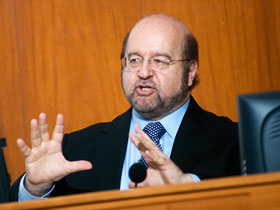  |
| HOME | THIS ISSUE | CALENDAR | PATENTS | BACK ISSUES | < BACK | NEXT > |
Economist advocates property rights as solution to global povertyby David Bauman - October 3, 2005 |
||||
|
Capitalism will thrive, and overcome even widespread poverty, but only if legal systems change to give the poor access to property rights, Peruvian economist Hernando de Soto told a UConn audience Monday. “When you create ownership as a concept and put it into law books, you have also created the rest of the market economy capitalist system,” de Soto told a standing-room-only crowd in Konover Auditorium. “I believe that capital is the source of, or explains to a great degree, the wealth of the developed world,” he said. “In the Third World, where I’m from, the poor have worked a lot. But what’s missing is a legal system and an institutional framework that allows us to leverage wealth.” Widely regarded as a dazzling thinker who has redefined the global debate on development theory, de Soto was invited to UConn as a speaker in the RBS Greenwich Capital Economic Seminar Series to discuss his internationally acclaimed policies advocating property rights for the poor as a solution to global poverty. A finalist for the Nobel Prize in Economics in 2002, de Soto is the president and founder of the Institute for Liberty and Democracy based in Lima. The Economist magazine called the institute one of the two most important think tanks in the world. Through the institute, de Soto has worked with world leaders in Asia, Latin America, the Middle East and Africa, revolutionizing the way they address enduring poverty. The world’s poor own $9.3 trillion in property, a sum, he said, that dwarfs the total amount of foreign aid given by developed nations to poorer ones in the past three decades. But the poor cannot unlock the potential of this “dead wealth” without the formal titles and property law systems that provide income-generating potential. “If you integrate the poor into the game, they can create wealth,” de Soto said. “It’s like tennis. If you know the rules, you play ball.” Property is the basis of the market economy, de Soto said. And strong private property rights allow people to borrow against their assets to set up businesses, and provides them with the incentive to be productive, because the system guarantees they can keep their profits. “How can anybody join a free-market economy without property?” he asked, adding that property ownership is the basis of credit, and credit is the route to development in any economy. “When people have credit, it means they have something to lose,” de Soto said. “By transforming people with real property interests into accountable individuals, you need a legal system that identifies them. Credit or capital is also unexplainable without property.”
Using Tanzania as an example, de Soto said 92 percent of all the buildings and land are owned outside the legal property system – that is, without recognized title deeds – and 88 percent of businesses are in the same situation. In much of the Third World, and the post-communist Eastern Bloc, huge quantities of land are held by the poor without legal title, and many small businesses have no legal standing, making them worthless for loans or in trade, he said. “At the time of the fall of the Berlin Wall,” de Soto recalled, “we all decided to take the capitalist route. Right now, it’s quite obvious that about 80 percent of the people in developing and former communist nations have not benefited from the system.” The reason for that, he said, is that markets and capitalism are about trading property rights. Asked whether the system can actually work for the majority of the people, de Soto said the key to getting a successful program off the ground is “to let local governments drive reforms. Establishing rights we take for granted is not easy. We can tell them what it takes to get developed, but not all systems are going to be the same. Switzerland is run by seven presidents, and in China they don’t have elections.” Founded in 1980, de Soto’s institute is credited with developing legal property systems that have moved hundreds of thousands of businesses and real estate holdings from the underground economy into the economic mainstream. In Peru alone, de Soto oversaw some 400 initiatives, laws and regulations that modernized and stabilized the nation’s economy between 1988 and 1995. His reforms gave property titles to more than 1.2 million families, and brought into the legal system some 380,000 firms that previously operated in the black market. In his best-selling books The Other Path (1986) and The Mystery of Capital: Why Capitalism Triumphs in the West and Fails Everywhere Else (2001), de Soto argues that free enterprise policies have not grabbed hold in developing nations because their leaders have failed to put into place a comprehensive and inclusive property system. |
| ADVANCE HOME UCONN HOME |

